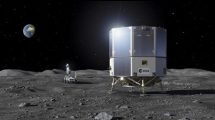
pic: ©vincent duterne
Space Applications Services, (SpaceApps), a major developer and integrator of systems and payloads for the International Space Station (ISS), on-orbit servicing and lunar destinations, will showcase its ICE Cubes service to delegates at IAC 2019 in Washington, DC from 21-25 October at booth 481.
ICE Cubes offers a simple, cost-effective way to fly research, technology or any activity on-board the ISS, opening up the research capability of the space station to the communities that will help to develop the LEO economy. This will be critically important to ensure that the ISS remains relevant when it is opened up to commercial opportunities.
ICE Cubes provides fast access to space for any researcher, company, school and university around the world. ICE Cubes payloads (from as small as 1U) are ideal to conduct scientific experiments, perform R&D in space and pursue in-orbit demonstration and validation of technologies.
“Making space a part of every-day value chains and businesses is vital to ensure that the LEO economy becomes viable for humanity in the future,” said Richard Aked, CEO, SpaceApps.
“In opening up access to this unique environment, we are allowing commercial entities as well as young people in research institutes the opportunity to see what they can do in space. It’s no longer the preserve of space agencies and huge technology companies but access is being democratised for all. It’s about real people seeing how they can benefit from space and how we develop a new future in the space environment.”
Fast-track access through ICE Cubes allows the development of disruptive innovation for R&D in pharma, biotech, novel materials, food, crop science, regenerative medicine and other highly relevant areas that actively benefit humanity through LEO environment assets. The access to a space environment also allows technology companies to validate and demonstrate their technologies, processes and systems and raise related TRL levels before bringing space technologies to their respective market.
“The beauty of the ICE Cubes service is that we are regularly delivering and returning payloads to the ISS and users can also interact in real-time with their experiments over the Internet, allowing them to send commands and to receive telemetry in real-time,” continues Aked. “We look forward to seeing the incredible developments that ICE Cubes will influence.”
ICE Cubes has a strategic partnership with ESA and is an accredited implementation partner with the ISS US National Lab that is responsible for operating the U.S. portion of the ISS as one of the national laboratories for use by non-NASA U.S. government agencies, academic institutions, and the private sector.












Add Comment